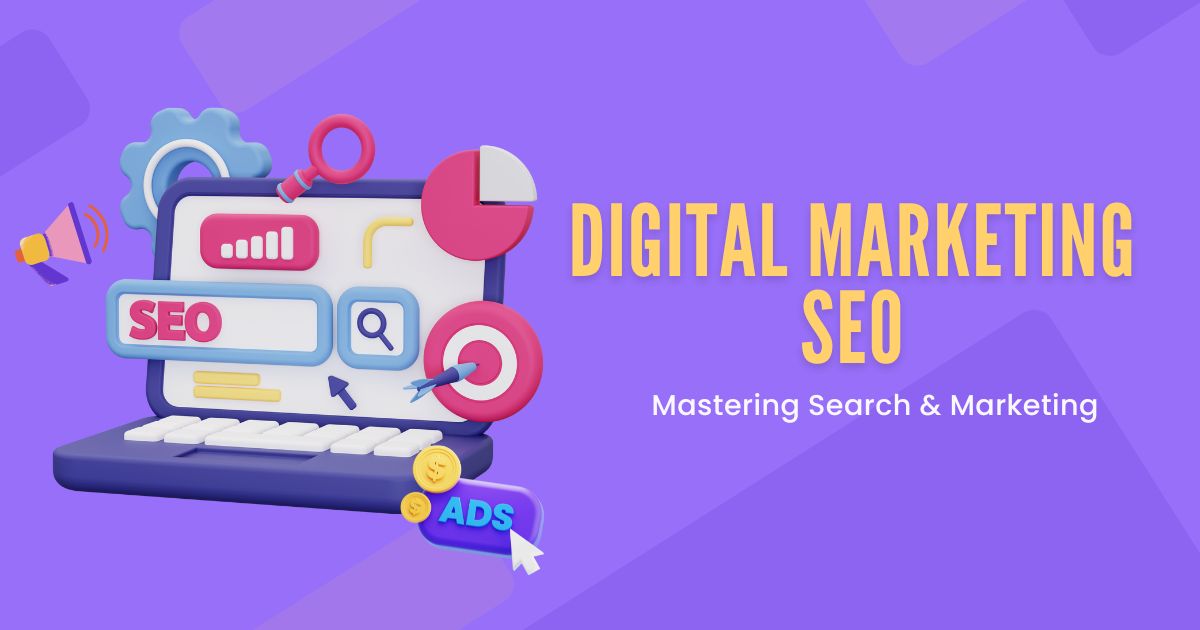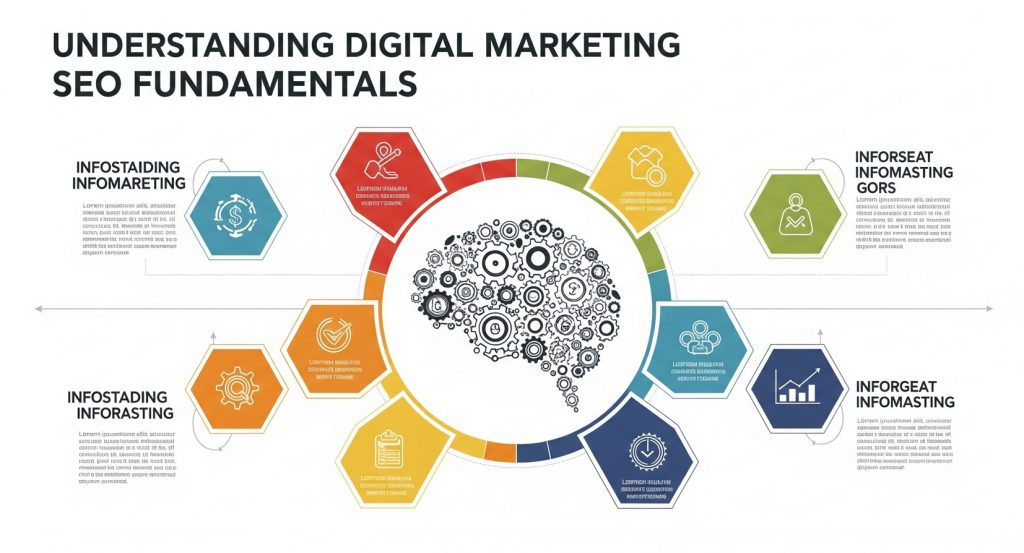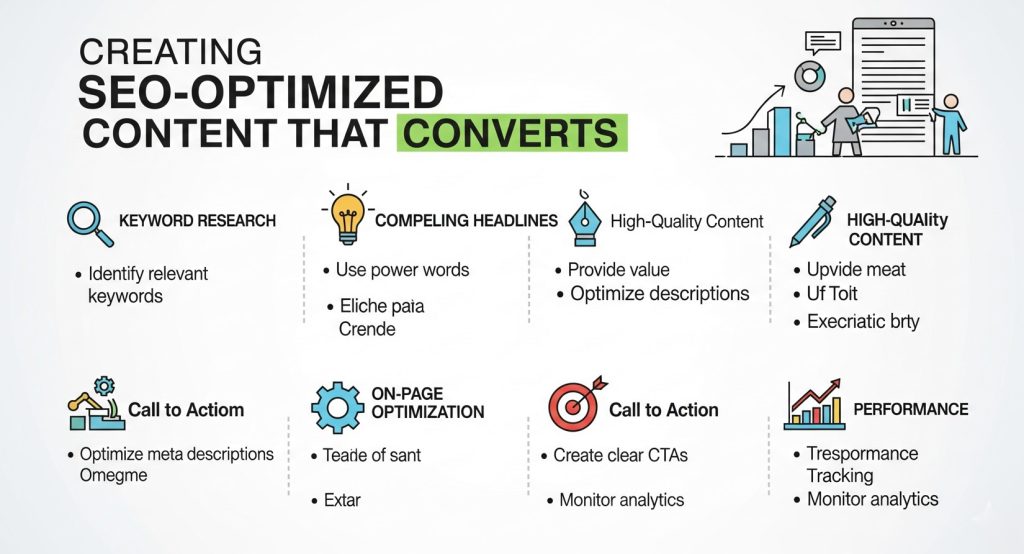
Digital marketing SEO blends content, technical optimization, and user experience to boost visibility, attract leads, and build long-term brand authority.
SEO isn’t just about keywords anymore. Modern digital marketing requires a strategic approach that combines technical expertise, content quality, and user experience to drive meaningful results. Whether you’re launching your first campaign or refining an existing strategy, understanding how SEO fits into your broader digital marketing efforts can make the difference between invisible content and industry authority.
This guide walks you through the essential components of digital marketing SEO, from foundational concepts to advanced tactics that drive real business growth. You’ll discover actionable strategies to improve your search rankings, increase organic traffic, and create content that resonates with both search engines and your target audience.
Understanding Digital Marketing SEO Fundamentals

Digital marketing SEO combines search engine optimization with broader marketing objectives to create a cohesive online presence. Unlike traditional SEO that focuses solely on rankings, this approach integrates search visibility with conversion goals, brand awareness, and customer acquisition.
The foundation starts with understanding search intent. When someone types a query, they’re looking for specific information, trying to solve a problem, or ready to make a purchase. Your content needs to match these intentions while supporting your business objectives.
Modern search algorithms evaluate hundreds of ranking factors, but three core elements remain consistently important: content quality, technical performance, and user experience. Google’s algorithm updates consistently emphasize these pillars, making them essential for any successful digital marketing strategy.
Keyword Research for Digital Marketing Success
Effective keyword research goes beyond search volume and competition metrics. Start by mapping keywords to your customer journey stages. Awareness-stage keywords often begin with “what is” or “how to,” while decision-stage keywords include “best,” “review,” or “buy.”
Tools like Google Keyword Planner, Ahrefs, or SEMrush can help, but also review digital marketing analytics for financial services if targeting niche industries. Long-tail keywords deserve special attention in digital marketing SEO.
Long-tail keywords deserve special attention in digital marketing SEO. While “digital marketing” might attract 50,000 monthly searches, “digital marketing strategies for small businesses” faces less competition and attracts more qualified traffic. These specific queries often convert better because they indicate clearer intent.
Consider seasonal trends and industry cycles when building your keyword strategy. B2B companies might see increased activity at year-end during budget planning, while retail businesses peak during holiday seasons.
Creating SEO-Optimized Content That Converts

Content creation for digital marketing SEO requires balancing search optimization with user value. Structure content for readability and SEO performance. Include internal links, for instance, linking to digital content marketing: your complete guide to enrich context.
Structure content for both readability and SEO performance. Use clear headings (H2, H3) that include related keywords naturally. Break up long paragraphs with bullet points, numbered lists, and visual elements that make content easier to scan and understand.
Include internal links to related content on your site. This helps search engines understand your content relationships while keeping visitors engaged longer. External links to authoritative sources can boost your content’s credibility when used appropriately.
Optimize meta titles and descriptions for click-through rates, not just keyword inclusion. Your meta description serves as ad copy in search results, so make it compelling enough to encourage clicks while accurately representing your content.
Technical SEO Essentials for Digital Marketers
Technical SEO ensures search engines can properly crawl, index, and understand your website. Start with site speed, mobile optimization, and structured data. For mobile-first optimization, refer to the Mobile SEO Guide: Complete Mobile-First Optimization.
Mobile optimization isn’t optional. Over 60% of searches happen on mobile devices, and Google uses mobile-first indexing for most websites. Ensure your site displays properly across all device sizes and loads quickly on mobile connections.
Create and maintain an XML sitemap that helps search engines discover all your important pages. Submit this sitemap to Google Search Console and Bing Webmaster Tools for faster indexing of new content.
Fix broken links and 404 errors regularly. These issues frustrate users and waste the crawl budget search engines allocate to your site. Use tools like Screaming Frog or Ahrefs to identify and resolve these problems systematically.
Local SEO Integration in Digital Marketing

Local SEO becomes crucial for businesses serving specific geographic areas. Optimize your Google Business Profile with accurate information, regular updates, and customer review management. This profile often appears prominently in local search results and can drive significant foot traffic.
Include location-based keywords in your content naturally. Instead of forcing “New York digital marketing agency” into every paragraph, create location-specific pages or content that genuinely serves local audiences.
Build local citations by ensuring your business name, address, and phone number (NAP) appear consistently across online directories, social media profiles, and industry listings. Inconsistent information confuses search engines and can hurt local rankings.
Encourage customer reviews and respond to them professionally. Reviews influence both search rankings and consumer decisions, making review management an essential component of local digital marketing SEO.
Measuring and Analyzing SEO Performance
Track metrics that align with your business goals, not just vanity numbers. While organic traffic growth indicates positive momentum, focus on metrics like qualified leads, conversion rates, and revenue attribution from organic search.
Google Analytics and Search Console provide essential data for SEO analysis. Monitor which pages drive the most valuable traffic, identify content gaps, and track ranking improvements for target keywords over time.
Set up goal tracking for key actions on your site, whether that’s form submissions, product purchases, or content downloads. This data helps you understand which SEO efforts contribute most to business growth.
Regular SEO audits help maintain performance and identify new opportunities. Review technical issues, content performance, and competitive changes quarterly to stay ahead of algorithm updates and market shifts.
Optimizing User Experience for SEO Success
Search engines increasingly prioritize user experience (UX) as a ranking factor. Pages that load quickly, provide clear navigation, and offer engaging, accessible content perform better in both search results and conversions.
Effective UX optimization begins with page layout and content hierarchy. Clear headings, descriptive subheadings, and logical content flow help users quickly find the information they seek. Visual cues like infographics, charts, and call-to-action buttons guide user behavior, keeping engagement high.
Site speed and mobile responsiveness are equally essential. Users abandon slow-loading pages, which increases bounce rates and negatively impacts rankings. Tools like Google PageSpeed Insights or Lighthouse provide actionable recommendations to improve performance, such as compressing images, enabling browser caching, and optimizing code.
By merging UX optimization with SEO best practices, you create a site that appeals to both search engines and visitors, increasing rankings, engagement, and conversions simultaneously.
Integrating Content Marketing with SEO

SEO is no longer just about keywords—it’s a holistic content strategy. Every blog post, video, infographic, or guide should support both search visibility and your broader marketing goals. Content marketing and SEO integration ensures that each asset contributes to audience engagement, lead generation, and brand authority.
Start by mapping content to the buyer journey. Awareness-stage content might include educational blog posts or “how-to” guides optimized for informational keywords, while decision-stage content could be product comparisons, case studies, or testimonials targeting transactional queries. By aligning content with intent, you attract the right audience and guide them toward conversion.
Internal linking is also crucial. Linking related content together creates a content ecosystem that signals topical authority to search engines and keeps users engaged longer. Each content piece should serve a dual purpose: answer the user’s questions while strengthening your overall SEO and brand narrative.
Harnessing Analytics for Continuous SEO Improvement
Data-driven decisions are essential in digital marketing SEO. Analytics platforms like Google Analytics, Search Console, and SEMrush provide deep insights into user behavior, traffic sources, and ranking performance.
Regularly analyze which keywords bring qualified traffic, which pages generate conversions, and which content underperforms. Look for trends, such as seasonal spikes in search volume, that can guide content creation and promotional efforts. Use these insights to refine meta titles, optimize underperforming pages, or identify new content opportunities.
Setting up conversion tracking and attribution models allows you to understand the direct business impact of SEO efforts. By linking organic traffic to revenue or lead generation, you can prioritize strategies that drive measurable ROI rather than vanity metrics like raw traffic alone.
Advanced Technical SEO Strategies
Technical SEO goes beyond basic site optimization. Structured data, canonical tags, hreflang for multilingual sites, and proper schema implementation can dramatically improve how search engines interpret and display your content.
For example, implementing FAQ or How-To schema can make your pages eligible for rich snippets, which increase click-through rates. Ensuring canonical tags are properly set prevents duplicate content issues, while hreflang tags ensure the right content reaches the right audience for international campaigns.
Regular technical audits are essential to catch issues like crawl errors, broken links, or misconfigured redirects. Tools like Screaming Frog, SEMrush Site Audit, and Google Search Console provide actionable insights that help maintain technical health, ensuring search engines can crawl, index, and rank your site effectively.
Advanced Digital Marketing SEO Strategies
Schema markup helps search engines understand your content context, potentially earning rich snippets in search results. Implement relevant schema types for your business, whether that’s organization markup, product reviews, or FAQ schemas.
Topic clustering creates content hubs around main themes, establishing topical authority in your industry. Instead of creating isolated blog posts, develop comprehensive content series that link together and cover subjects thoroughly.
Voice search optimization requires focusing on conversational queries and featured snippet optimization. Create content that directly answers questions your audience asks, formatted in ways that search engines can easily extract and display.
Consider video SEO as visual content continues growing in importance. Optimize video titles, descriptions, and thumbnails for search, and create transcripts to make video content more accessible to search engines.
Building Your SEO-Driven Digital Marketing Strategy
Success in digital marketing SEO requires consistent effort, patience, and strategic thinking. Start by auditing your current performance, identifying quick wins, and developing a content calendar that supports both SEO and business objectives.
Remember that SEO works best when integrated with other digital marketing channels. Social media amplifies your content reach, email marketing nurtures leads generated through organic search, and paid advertising can complement organic efforts during competitive periods.
Stay current with algorithm updates and industry changes, but don’t chase every trend. Focus on creating valuable content and maintaining technical excellence—these fundamentals remain constant even as search engines evolve.
The most successful digital marketing SEO strategies balance immediate needs with long-term growth. Quick optimizations can provide early momentum, while comprehensive content development and technical improvements drive sustained success over time.
Audit current performance, identify quick wins, and develop a content calendar that supports SEO and business objectives. Tools and strategies from digital marketing strategies that drive real results can help maximize outcomes.
How often should I perform an SEO audit?
Ideally, conduct a full SEO audit quarterly. This helps identify technical issues, content gaps, and emerging keyword opportunities, ensuring your strategy adapts to algorithm updates and market trends.
What is the difference between on-page and off-page SEO?
On-page SEO focuses on optimizing elements on your website, such as content, meta tags, and internal links. Off-page SEO involves external factors like backlinks, social signals, and online reputation, which contribute to domain authority.
How do I measure the ROI of SEO?
Track metrics tied to business objectives, such as organic traffic, lead generation, sales, or conversions. Use attribution models to link specific SEO actions to measurable business outcomes.
Are long-tail keywords more valuable than short-tail keywords?
Long-tail keywords often have lower search volume but higher conversion potential because they indicate clearer user intent. They also face less competition, making it easier for smaller or newer sites to rank.
How important is mobile optimization for SEO?
Extremely important. Google uses mobile-first indexing, meaning your mobile site version determines your search rankings. Slow or poorly formatted mobile sites can harm both UX and SEO performance.
Can SEO help with brand authority?
Yes. High-ranking, informative content builds credibility and trust. Over time, your site can become a go-to resource in your industry, attracting backlinks, media mentions, and loyal audiences.
How do I optimize content for voice search?
Focus on natural, conversational queries and questions. Incorporate long-tail, question-based keywords and concise answers to improve the likelihood of appearing in featured snippets for voice assistants.

Leave a Reply